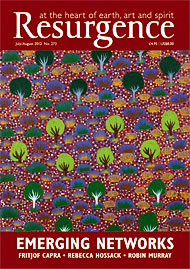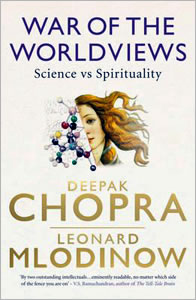A few years ago, Deepak Chopra was giving a talk at Caltech when some questions about physics emerged. The moderator recognised a renowned physicist in the audience and invited him to speak. It was Leonard Mlodinow, co-author with Stephen Hawking of The Grand Design. Instead of making a comment, Leonard offered to teach Deepak quantum physics. Amused, Deepak accepted, and in turn he eventually started training Leonard in meditation. As they are both good writers, one could think they would end up producing one more good book on the common ground between science and spirituality (such as The Quantum and the Lotus, by Buddhist monk Matthieu Ricard and astrophysicist Trinh Xuan Thuan, or the Mind and Life series of dialogues between the Dalai Lama and outstanding Western scientists). But they found themselves strongly disagreeing about their worldviews – whilst keeping their mutual respect. And from their deep but respectful disagreement this book was born.
War of the Worldviews is a collection of short essays in which the authors engage in a lively contest to show whether mainstream science gives us an accurate and eventually complete understanding of the world (as Leonard would have it), or whether the wonders we see around us could never be reduced to simple mechanical laws (as Deepak believes). In alternate chapters, they take turns in addressing crucial questions relating to the cosmos, life and the mind; questions such as “Is the universe conscious?”, “What is the nature of time?”, “Did Darwin go wrong?”, “Is there a fundamental reality?”, and “Is the brain like a computer?” For instance, Leonard believes that science will eventually show consciousness to be a by-product of the brain. Deepak is convinced that this could never happen but rather that consciousness is the ultimate observer that looks through the telescope of science, and the telescope is unable to observe the observer.
Needless to say, most Resurgence readers will likely agree with Deepak. And he has the advantage of knowing much more about science than Leonard knows about spirituality. (Indeed, Deepak’s biology is much more up to date than Leonard’s!) And yet the game is quite even, as Leonard is clever enough to defend well his position and to occasionally find weak points in some of Deepak’s arguments. In any case, they both deserve to be thanked for embarking on this mighty adventure of ideas.
After writing the book (and touring the US together promoting it) they each remain convinced about their respective worldviews, and so will most of the readers. Our worldviews run so deep that they can very rarely be transformed by rational argumentation. Indeed, Deepak himself writes: “Reductionists cannot, in my experience, be talked out of believing in a world where physical processes can eventually explain meaning, purpose and all the rest.” Leonard could well be described as a reductionist (albeit a nice and open-minded one, unlike the fundamentalist sort led by Richard Dawkins). Leonard believes that randomness and materialism provide a true enough description of the world, and he doesn’t hesitate to acknowledge that science shows human beings to be “isolated specks in the cosmos, accidental outcroppings of mind in a mindless creation”. But how could that consciousness evolve from inanimate matter? How do we explain the rich world of meaning and beauty we find around us? How could meaning evolve from meaninglessness?
One objection that can be raised to both authors is that ‘science’ is here taken to mean only mainstream modern science. But other kinds of reliable scientific knowledge are possible, not necessarily based in the reductionistic assumptions of current scientific practice. As Rupert Sheldrake argues in his latest book, The Science Delusion (see review, page 61), most of contemporary science is “being held back by centuries-old assumptions that have hardened into dogmas”.
Towards the end of the book, Deepak warns that “a world ruled completely by science”, with no ethics or spirituality guiding it, “would be hell on Earth.” If something is to prevent us from falling into that hell it won’t be science, but the evolution of our consciousness. He concludes that “once science ventures to dismantle faith, striving, love, free will, imagination, emotion, and the higher self as so many illusions cooked up in our fallible brain, a rescue effort must be mounted, and quickly.” We need new forms of science in which consciousness and spirituality are recognised as core dimensions of the universe.








